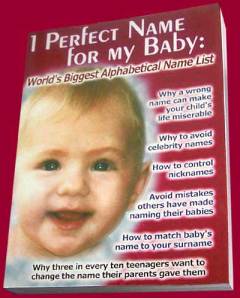The Criminal Situation of Certain Names
Posted by The Situationist Staff on February 2, 2009
 John Cloud of TIME Magazine has an interesting piece on a study finding that adolescent boys with unpopular names are likelier than other boys to be referred to the juvenile-justice system for alleged offenses. We excerpt it below.
John Cloud of TIME Magazine has an interesting piece on a study finding that adolescent boys with unpopular names are likelier than other boys to be referred to the juvenile-justice system for alleged offenses. We excerpt it below.
* * *
In the Shel Silverstein–penned Johnny Cash hit “A Boy Named Sue,” a father explains that he gave his son so improbable a name because “I knew you’d have to get tough or die, and it’s that name that helped to make you strong.” It turns out that your first name may also help make you a criminal.
In a new study to be published in the March issue of Social Science Quarterly, David Kalist and Daniel Lee, economists at Shippensburg University in Pennsylvania, find that adolescent boys with unpopular names are likelier than other boys to be referred to the juvenile-justice system for alleged offenses. The researchers conclude that the Ernests, Prestons and Tyrells of America are significantly more delinquent than the Michaels and Davids. Why? (See the top 10 crime stories of 2008.)
The short answer is that our names play an important role in shaping the way we see ourselves — and, more important, how others see us. Abundant academic literature proves these points. A 1993 paper found that most people perceive those with unconventionally spelled names (Patric, Geoffrey) as less likely to be moral, warm and successful. A 2001 paper found that we have a tendency to judge boys’ trustworthiness and masculinity from their names. (As a guy whose middle name is Ashley, I can attest to the second part.) In a 2007 paper (here’s a PDF), University of Florida economist David Figlio found that boys with names commonly given to girls are likelier to be suspended from school. And an influential 1998 paper co-authored by psychologist Melvin (a challenging first name if there ever was one) Manis of the University of Michigan reported that “having an unusual name leads to unfavorable reactions in others, which then leads to unfavorable evaluations of the self.”
* * *
To read the rest of the piece, click here. For a sample of related Situationist posts, see “John Darley on “Justice as Intuitions” – Video,” “The Situation of a Name,” “Jock or Nerd? Where Did You Sit at the Dinner Table?,” and “Women’s Situation in Economics.”


















Leave a comment